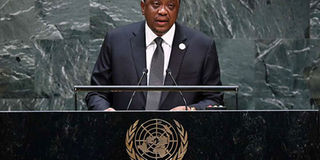Uhuru’s push for talks on Somalia border row flops

Kenya's President Uhuru Kenyatta speaks during the 74th Session of the General Assembly at the United Nations headquarters in New York on September 25, 2019. He is calling for dialogue to end the maritime boundary dispute with Somalia. PHOTO | JOHANNES EISELE | AFP
What you need to know:
- President Kenyatta had said he was open to any resolution, but emphasised on dialogue as the best option to find a solution.
- But Mr Farmajo dismissed the AU as a body with no capacity to intervene in the case before the court.
All efforts by Kenya to resolve the maritime boundary dispute with Somalia out of court have failed, with Somalia President Mohamed Abdullahi Farmajo telling the United Nations General Assembly in New York on Thursday that there was no room for dialogue.
The announcement, made during his inaugural speech at the forum, came as a damper on the efforts of President Uhuru Kenyatta, who had told the conference that Kenya is seeking a diplomatic solution to the boundary row.
There had been hope when Presidents Kenyatta and Farmajo earlier held a meeting mediated by Egyptian President Abdel Fattah al-Sisi – the current African Union chairman – but the Somalia leader was categorical that the dispute would not be on the table.
HEARINGS
The International Court of Justice (ICJ) will now have to resolve the matter. Public hearings on the case filed by Somalia will run from November 4-8.
“We are very pleased that the court found that it had jurisdiction to resolve the dispute and that is scheduled for the final hearing for the merit case in November this year,” President Farmajo said.
“We trust that when that judgment will be issued and the boundary established, a lasting settlement of this long-lasting dispute will finally be achieved. We will abide by the court ruling.”
BEST OUTCOME
Mogadishu has shut the door on Kenya’s push to have the African Union broker the negotiations, with President Farmajo saying the talks between the two countries had completely collapsed.
Mr Farmajo dismissed the AU as a body with no capacity to intervene in the case before the court.
Mr Kenyatta, on the other hand, said the African Union Peace and Security Council had given them the greenlight to negotiate.
President Kenyatta had said he was open to any resolution, but emphasised on dialogue as the best option to find a solution.
“I have always believed and stood my ground that dialogue is the best and amicable way for finding the best and positive solution. This brings us together as opposed to a conflict that pushes us away from each other,” the President said.
This is not the first time Somalia has insisted on the ICJ option. President Farmajo has never been open to dialogue on the matter.
REDRAW
Another attempt by Kenya to negotiate through the mediation of Ethiopian Prime Minister Abiy Ahmed in March also flopped, as the two states failed to agree on the agenda.
Kenya – through the President and Foreign Affairs Cabinet Secretary Monica Juma – has been on a diplomatic charm offensive on the continent and beyond, lobbying for support for its position on the maritime boundary and even seeking a seat on the UN Security Council, the body that is supposed to oversee global security.
Somalia sued Kenya at the ICJ seeking to redraw the border from the current easterly flow, and instead follow the extension of the land border south of Kiunga, which flows diagonally.
The area could affect up to 100,00km2 thought to be rich in natural gas. It means the ICJ will have to determine where the boundary should be when public hearings open in The Hague.





